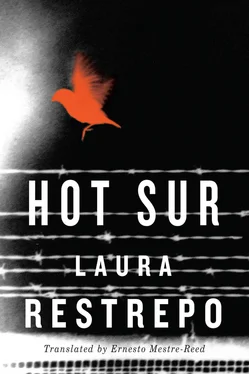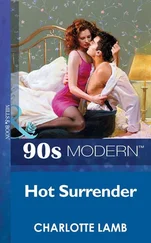“You’ll see, Pa,” Cleve had assured him the first time he took him there. “Here they only take six minutes to serve all the bad cholesterol you want.”
It was true: service did not take a second longer, six minutes exactly to bring everything to the table. Cleve timed them to show his father, and on top of that they were as efficient as they were sullen, something Ian Rose appreciated, because he disliked nothing more than that self-interested, syrupy kindness prevalent throughout the city. But not at the Lyric; there no one greeted you with a phony smile or said good-bye with a gelid “have a nice day.” The boys of the Lyric screamed from your table to the kitchen: “Blind eyes!” for poached eggs, “Drop them!” for eggs over easy, or “Shatter them!” for scrambled.
This time Rose was alone and not very hungry, so he only ate a quarter of the mountain of food they brought him, then pushed his plates aside and brought out pen and paper to make notes about what he’d have to ask Pro Bono, María Paz’s attorney, in a few hours. Right away he felt as if the rude wait staff of the Lyric were sending disproving glances his way, not happy that he had turned the table into a desk. Because just as speedily as they served you, they rushed you out, with the last bite still in your mouth, so the next diner could be accommodated. Rose gathered his belongings without having written anything, because aside from the obvious he really didn’t know what to ask the lawyer; and besides, how much could he ask in ten minutes, which is what he had been granted for the meeting, not a lot of time, enough for a hello and good-bye and that’s it. After leaving the Lyric, he walked to the Strand, where they often had Cleve’s graphic novels, and he went in to see if they had any. He found a bunch of them in a remote corner of the store, marked down from $12.00 to $3.50, and he felt a stab in his chest. He put them all in his cart and walked to the cashier. There were fifteen of them and he was going to buy them all. He’d take them and keep them in the house because it had pained him to see them so marked down, almost given away. He felt it was an unmerited degradation, a premature push toward oblivion.
“Excellent!” the cashier told Rose when he saw all the copies of the same book. He was young and slight as a tadpole, with a red-and-black hankie tied around his neck and a small dragon tattooed on his arm. “I see you too are a fan of the Suicide Poet… ”
“Are you?” Rose murmured, and his eyes watered.
“Of course. Bedside reading! And believe me, I’m not the only one. They’re going to be disappointed when they see we’re out of copies.”
“Then I’ll take only two,” Rose said. “Keep the rest; I don’t want to be a hog.”
He walked up Broadway with the two books under his arm and headed to Union Square, where he got on the subway that would take him to the lawyer’s office in Brooklyn Heights. In María Paz’s manuscript the man’s first and last name had been mentioned, although here he appears only by his pseudonym, Pro Bono, because as far as I can tell, everyone in this story has something to hide and I’d rather not reveal their true names. María Paz alluded to the fact that her defense attorney was retired, and judging by the fascination bordering on love with which she referred to him, at first Ian Rose had imagined the lawyer to be the old legalistic type with Don Juan airs, with a toupee to hide his baldness, a pair of shiny black shoes à la Fred Astaire, and strong men’s cologne to hide the acrid smell of old age.
“Not even close, Mr. Rose,” Ming, Cleve’s editor and friend, who had done Ian Rose the favor of setting up the meeting, had corrected him. “This lawyer is famous. World famous even. He’s not some schmuck.”
Ming, who had known about Pro Bono before all of this, had added to his knowledge by digging a little deeper here and there. Through Ming, Rose found out that in his glory days, Pro Bono had been the Sardinian heavyweight in global litigation over water rights, acting as defender of local communities against the multinational corporations that sought to commercialize natural resources. He had successfully blocked several multimillion mega-projects to privatize water supplies in places such as Bolivia, Australia, and Pakistan, and also at home, in California and Ohio. And it hadn’t been a little quarrel: Pro Bono had made a specialty of kicking some serious thugs in the ass, so much so that once, in Cochabamba, Bolivia, there had been an attempt on his life for going around as a spokesperson of a huge mobilization of indigenous women who would not let the water be taken from their ancient wells because the multinational banks felt like privatizing them as a condition of debt renegotiations.
“Well, well,” Rose said to Ming, “so I’m going to meet with the champion of the world’s hungry.”
As might be expected, not everything about the lawyer had been altruistic, because the fights he had won had also brought him significant wealth. So he had retired at seventy-five; tired of his philanthropic adventures and his pockets full, and facing a life of rose gardening, he had opted to take on lesser cases pro bono, that is, to defend people such as María Paz, who could not afford a private attorney, for nothing.
“That’s your man,” Ming said. “Unmistakable, as you will see, because of his physical appearance.”
“Why?”
“A little issue. Well, a particularity, but rather obvious.”
“Is he blind? Because he deserves a medal of merit if on top of everything he’s blind.”
“No, not that.”
“Deaf-mute? Lame? Cleft lip?”
“Hunchback.”
Hunchback. The word itself was taboo and therefore unmentionable. An only child, pampered and protected by his parents, Pro Bono himself had not been aware of the implications of his deformity until he was six, when he started school and others began to point at him. But even at that age he showed resources with which to defend himself. One day, he grew sick of another kid who pushed him to the end of his rope calling him a camel.
“Don’t call me a camel, you moron, don’t you know a camel has two humps, not one?” Pro Bono screamed at him, pushing him to the ground.
The fact that he was intelligent and came from a traditional rich East Coast family shielded him against any complex he may have developed about being lesser than. As a teenager, the fact that his defect was taboo became a motivation to openly flaunt it. He never avoided looking at himself in the mirror; on the contrary, he stood before a double mirror to make his peace with that strange, almost mythological body that had been his lot. He repeated the word “hunchback” to himself until owning it and knowing it was human, and also all the degrading insults — hunchbacked, camel, retard, hunchy, dromedary, humpbacked, humpy — and in removing their thorns, he neutralized the degradation they carried. He also repeated the euphemisms that were meant to sidestep his true condition — invalid, special, disabled — because he knew that if anything could harm him more than the deformity itself it was the misleading silence and the pious metaphors. Through books, he had developed a certain pride in the uniqueness of being a part of the family that included Victor Hugo’s hunchback Quasimodo, Hawthorne’s Aminadab, and Dickens’s Daniel Quilp. He was pleased that Homer had singled out Tiresias, endowing him with a hump, as did Shakespeare with Caliban from The Tempest and with Richard III. Literature had wanted to present all of these first cousins, his brothers, as hunchbacked and deviant, making their physical condition a manifestation of their spiritual defects. But this wasn’t the case. Pro Bono knew them very well and saw them otherwise, feeling affection for all of them, understanding their motivations, and from the time he was an adolescent he had set his mind to come to their defense and those of their like, clearing their names, making it evident once and for all that a hunchback need not be one of the miserable ones.
Читать дальше












